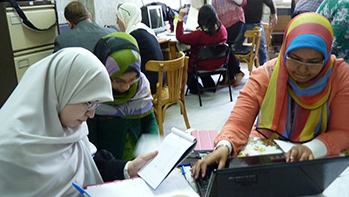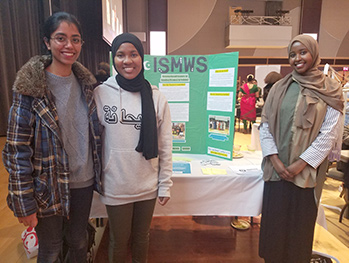Sultana Nahar knew from an early age that she had a love for science, particularly astronomy. After moving from her native Bangladesh to the United States and earning her Ph.D. at Wayne State University, Nahar began working at The Ohio State University in 1990. As a research professor in astronomy, Nahar studies astrophysical atomic processes by utilizing the Ohio Supercomputer Center (OSC) in her data-intensive research.
While assisting a Ph.D. student at Beni Suef University in Egypt in 2008, Nahar was asked by the student’s advisor if she would be interested in traveling to Egypt to deliver a keynote address at the Modern Trends in Physics Research international conference.
“It was the first Islamic country I went to for a conference,” Nahar said. “When I went there, I was surprised that there were very few female scientists, but they are all eager to do research.”
Following her presentation, Nahar was approached by a female Sudanese scientist who expressed gratitude for the address. Conversing with her, Nahar soon realized that many more female scientists lacked the outside support and collaboration needed to take their research to the next level. Moved by the experience, she pondered how she might help.
In April 2010, Nahar founded the International Society of Muslim Women in Science (ISMWS), an organization engaged in supporting Muslim women participating in scientific research around the world. The society currently has over 500 members from 31 countries.
One means of support the organization provides to these researchers is exposure to crucial research tools, such as high performance computing (HPC). Through ISMWS, Nahar has been able to partner with researchers and conduct research-based computational workshops around the world on projects using OSC resources.

“For example, my Turkish collaborator is an ISMWS member. She and another collaborator were able to use OSC with me and they just published a paper,” Nahar said. “These kinds of collaborations are being carried out quite a bit, actually, and are still going on.”
ISMWS has expanded to include a student chapter at Ohio State to support students as they start their research careers in college. Nahar hopes this organization will empower Muslim women to uphold their values while simultaneously pursuing scientific disciplines with the support of advanced research technologies like HPC.
___________
PROJECT LEAD // Sultana Nahar, Ph.D., The Ohio State University
WEBSITE // astronomy.ohio-state.edu/~nahar

